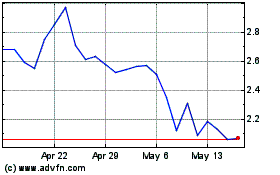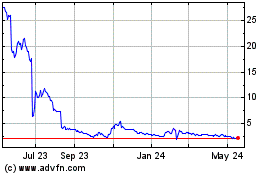BioXcel Therapeutics, Inc. (Nasdaq: BTAI), a biopharmaceutical
company utilizing artificial intelligence to develop transformative
medicines in neuroscience, today announced a collaboration
with the University of North Carolina at Chapel Hill (UNC) on a
grant awarded by the U.S. Department of Defense (DoD) to evaluate
the efficacy and safety of BXCL501 as a potential treatment for
acute stress disorder (ASD).
The award provides $2.8 million to the UNC Institute for Trauma
Recovery from September 15, 2024 through September 14, 2026 to
evaluate the potential efficacy of BXCL501 to reduce ASD symptom
severity and/or posttraumatic neuropsychiatric symptoms. The
double-blind, placebo-controlled trial is expected to enroll 100
patients experiencing ASD resulting from motor vehicle collisions,
beginning in the first half of 2025. BioXcel Therapeutics will
supply BXCL501 for the trial.
ASD symptoms occur in the days and weeks after trauma, and
include anxiety, sleep disturbance, concentration difficulty, pain,
and somatic symptoms such as dizziness and lightheadedness. Chronic
adverse posttraumatic neuropsychiatric symptoms occur when acute
stress reaction does not resolve, and include persistent pain,
posttraumatic stress, and depressive symptoms. ASD prevalence
varies considerably based on the study and nature of the trauma. An
estimated 40 million Americans annually go to the emergency
department after a traumatic experience.1
“There is an urgent need for effective interventions to prevent
the development of these ‘invisible wounds,’” said Principal
Investigator Samuel McLean, M.D., MPH, Professor of Psychiatry and
Emergency Medicine and Director of the Institute for Trauma
Recovery at the UNC School of Medicine. “Fortunately, advances in
research methods and biologic understanding have created an
opportunity to develop interventions to prevent symptoms associated
with ASD. We look forward to initiating this important study of
BXCL501, which could potentially be administered to patients in the
early aftermath of severe trauma to reduce acute stress symptoms
and prevent the emergence of chronic symptoms.”
“In addition to our development of PRN dosing treatment with
BXCL501 for agitation associated with bipolar disorders,
schizophrenia, and Alzheimer’s dementia, BXCL501 may have potential
as a precision medicine for short-term treatment of the spectrum of
symptoms related to trauma and stress-related disorders,” said
Frank Yocca, Ph.D., Chief Scientific Officer of BioXcel
Therapeutics. “Our lead neuroscience asset is currently being
evaluated by Yale University School of Medicine for the potential
short-term treatment of PTSD related to alcohol and substance abuse
disorder, and we are pleased that a second externally funded trial
will soon commence led by another prominent academic research
institution.”
The ASD research is supported by the DoD under award
number HT9425-24-1-1108. The content presented in this release
is solely the responsibility of the authors and does not
necessarily represent the official views of the DoD.
About BXCL501 Government-Supported
Investigator-Initiated Trials In addition to Acute Stress
Disorder (ASD), BioXcel Therapeutics has been awarded grant
programs for the development of BXCL501 for the potential treatment
of post-traumatic stress disorder (PTSD)/alcohol use disorder (AUD)
and opioid use disorder (OUD). A PTSD/AUD outpatient trial is
being led by clinical researchers and regulatory staff at Yale
University Medical School and funded through a cooperative
agreement with the DoD’s Pharmacotherapies for Alcohol and
Substance Use Disorders Alliance. An OUD inpatient trial is being
led by clinical researchers and regulatory staff at Columbia
University and funded through a cooperative agreement with the
National Institute on Drug Abuse (NIDA).
About BXCL501Outside of its
approved indication by the U.S. Food and Drug Administration as
IGALMI™ (dexmedetomidine) sublingual film, BXCL501 is an
investigational proprietary, orally dissolving film formulation of
dexmedetomidine, a selective alpha-2 adrenergic receptor agonist.
BXCL501 is under investigation by BioXcel Therapeutics for the
acute treatment of agitation associated with bipolar I or II
disorder or schizophrenia in the at-home setting and for the acute
treatment of agitation associated with Alzheimer’s dementia. The
safety and efficacy of BXCL501 for these investigational uses have
not been established. BXCL501 has been granted Breakthrough Therapy
designation by the FDA for the acute treatment of agitation
associated with dementia and Fast Track designation for the acute
treatment of agitation associated with schizophrenia, bipolar
disorders, and dementia.
About BioXcel Therapeutics, Inc.BioXcel
Therapeutics, Inc. (Nasdaq: BTAI) is a biopharmaceutical company
utilizing artificial intelligence to develop transformative
medicines in neuroscience. Its wholly owned subsidiary, OnkosXcel
Therapeutics, is focused on the development of medicines in
immuno-oncology. The Company’s drug re-innovation approach
leverages existing approved drugs and/or clinically validated
product candidates together with big data and proprietary machine
learning algorithms to identify new therapeutic indications. For
more information, please visit bioxceltherapeutics.com.
Forward-Looking Statements
This press release includes “forward-looking statements” within the
meaning of the Private Securities Litigation Reform Act of 1995. We
intend such forward-looking statements to be covered by the safe
harbor provisions for forward-looking statements contained in
Section 27A of the Securities Act of 1933, as amended and Section
21E of the Securities Exchange Act of 1934, as amended. All
statements contained in this press release other than statements of
historical fact should be considered forward-looking statements,
including, without limitation, statements related to: the expected
funding, timing and outcome of trial of BXCL501 evaluating its
ability to potentially treat agitation resulting from acute stress
disorder. When used herein, words including “anticipate,”
“believe,” “can,” “continue,” “could,” “designed,” “estimate,”
“expect,” “forecast,” “goal,” “intend,” “may,” “might,” “plan,”
“possible,” “potential,” “predict,” “project,” “should,” “target,”
“will,” “would” and similar expressions are intended to identify
forward-looking statements, though not all forward-looking
statements use these words or expressions. In addition, any
statements or information that refer to expectations, beliefs,
plans, projections, objectives, performance or other
characterizations of future events or circumstances, including any
underlying assumptions, are forward-looking. All forward-looking
statements are based upon the Company’s current expectations and
various assumptions. The Company believes there is a reasonable
basis for its expectations and beliefs, but they are inherently
uncertain. The Company may not realize its expectations, and its
beliefs may not prove correct. Actual results could differ
materially from those described or implied by such forward-looking
statements as a result of various important factors, including,
without limitation: its limited operating history; its incurrence
of significant losses; its need for substantial additional funding
and ability to raise capital when needed; the impact of the
reprioritization; its significant indebtedness, ability to comply
with covenant obligations and potential payment obligations related
to such indebtedness and other contractual obligations; the Company
has identified conditions and events that raise substantial doubt
about its ability to continue as a going concern; its limited
experience in drug discovery and drug development; risks related to
the TRANQUILITY program; its dependence on the success and
commercialization of IGALMI™, BXCL501, BXCL502, BXCL701 and BXCL702
and other product candidates; the number of episodes of agitation
and the size of the Company’s total addressable market may be
overestimated, and approval that the Company may obtain may be
based on a narrower definition of the patient population; its lack
of experience in marketing and selling drug products; the risk that
IGALMI or the Company’s product candidates may not be accepted by
physicians or the medical community in general; the Company still
faces extensive and ongoing regulatory requirements and obligations
for IGALMI; the failure of preliminary data from its clinical
studies to predict final study results; failure of its early
clinical studies or preclinical studies to predict future clinical
studies; its ability to receive regulatory approval for its product
candidates; its ability to enroll patients in its clinical trials;
undesirable side effects caused by the Company’s product
candidates; its novel approach to the discovery and development of
product candidates based on EvolverAI; the significant influence of
and dependence on BioXcel LLC; its exposure to patent infringement
lawsuits; its reliance on third parties; its ability to remain
listed on the Nasdaq Capital Market and impacts from any potential
delisting on the Company and its ability to raise capital; its
ability to comply with the extensive regulations applicable to it;
impacts from data breaches or cyber-attacks, if any; risks
associated with the increased scrutiny relating to environmental,
social and governance (ESG) matters; risks associated with federal,
state or foreign health care “fraud and abuse” laws; and its
ability to commercialize its product candidates, as well as the
important factors discussed under the caption “Risk Factors” in its
Annual Report on Form 10-K for the fiscal year ended December 31,
2023, as such factors may be updated from time to time in its other
filings with the SEC, including without limitation its Quarterly
Report on Form 10-Q for the quarterly period ended June 30, 2024,
which are accessible on the SEC’s website at www.sec.gov. These and
other important factors could cause actual results to differ
materially from those indicated by the forward-looking statements
made in this press release. Any such forward-looking statements
represent management’s estimates as of the date of this press
release. While the Company may elect to update such forward-looking
statements at some point in the future, except as required by law,
it disclaims any obligation to do so, even if subsequent events
cause our views to change. These forward-looking statements should
not be relied upon as representing the Company’s views as of any
date subsequent to the date of this press release.
Contact Information
Corporate/InvestorsBioXcel TherapeuticsErik Kopp
1.203.494.7062
MediaRusso PartnersDavid Schull 1.858.717.2310
Source: BioXcel Therapeutics, Inc.
References
- Kessler, R.C., Ressler, K.J., House, S.L. et
al. Socio-demographic and trauma-related predictors of PTSD
within 8 weeks of a motor vehicle collision in the AURORA
study. Mol Psychiatry 26, 3108–3121 (2021).
https://doi.org/10.1038/s41380-020-00911-3
BioXcel Therapeutics (NASDAQ:BTAI)
Historical Stock Chart
From Dec 2024 to Jan 2025

BioXcel Therapeutics (NASDAQ:BTAI)
Historical Stock Chart
From Jan 2024 to Jan 2025
